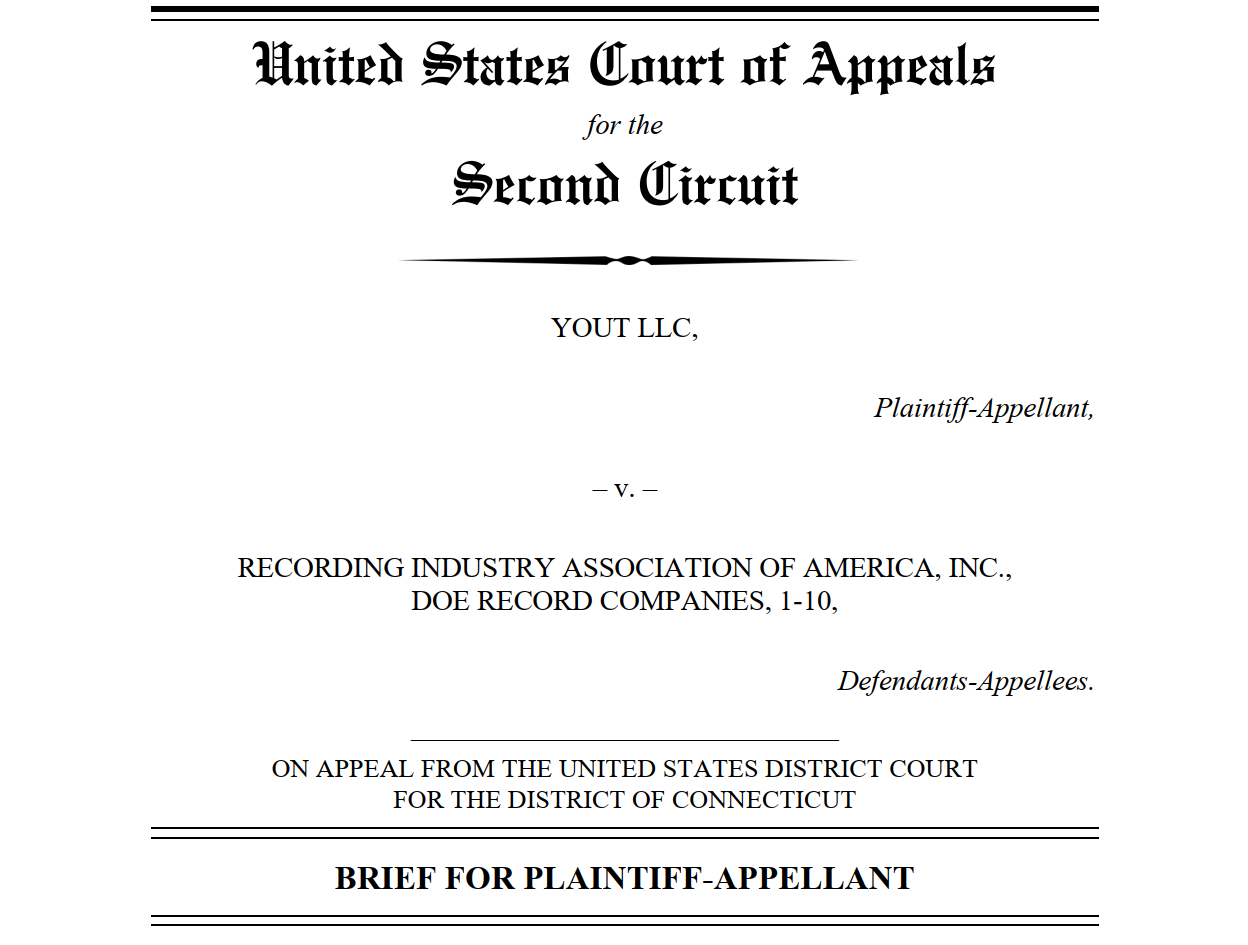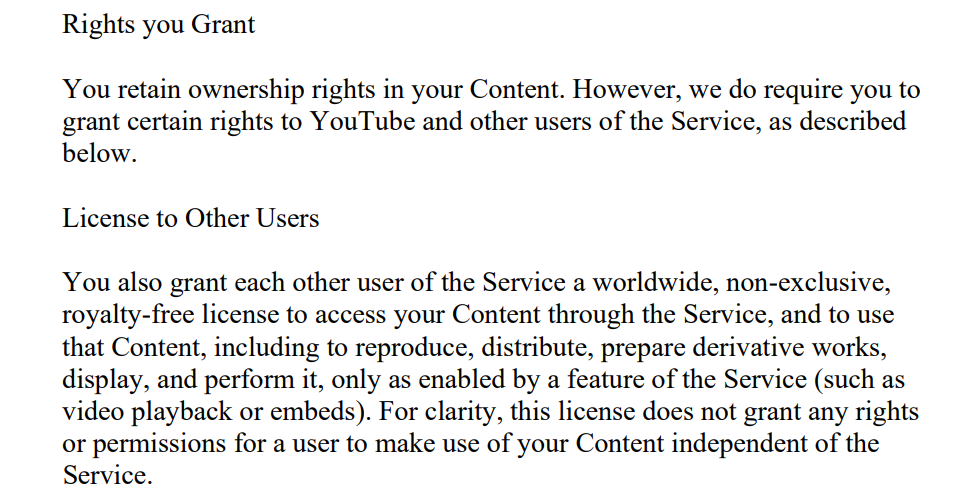
Popular stream-ripping site Yout.com has filed its appeal brief at the United States Court of Appeals for the Second Circuit. The service aims to reverse a district court ruling that dismissed Yout’s claims against the RIAA. Yout seeks a declaration that it doesn’t violate the DMCA and accuses the music industry group of defamation and business disparagement.
YouTube’s terms and service prohibit users from downloading audio and video, but there are numerous ‘stream-ripping’ sites available on the web that do just that.
These services are a thorn in the side of recording labels which consider them a major piracy threat. Some operators of these stream-ripping tools disagree, pointing at the variety of legal use cases instead.
At the end of 2020, the operator of one of the largest stream-rippers took matters into his own hands. Instead of hiding in the shadows like some competitors, Yout.com owner Johnathan Nader sued the RIAA, asking the federal court in Connecticut to declare his service non-infringing.
Last fall, the district court decided to dismiss the matter, handing a win to the RIAA. Judge Stefan Underhill ultimately concluded that Yout had failed to show that it doesn’t circumvent YouTube’s technological protection measures. This also rendered the associated defamation and business disparagement claims moot.
Yout.com Opens Appeal
Yout did not give up on the case. Site operator Johnathan Nader opted to appeal the case as he believes that YouTube rippers don’t violate the DMCA. After the RIAA’s request for legal fees was denied, Yout’s attorneys have filed their opening brief at the Court of Appeals for the Second Circuit.

The appeal begins by pointing out that the case deals with novel issues regarding the DMCA’s anti-circumvention provision. One of the key questions is whether YouTube videos have effective technological measures that aim to prevent the public from accessing copyrighted works.
Arguing that there is no DRM or encryption protecting the videos, Yout says that’s not the case here.
“Neither YouTube nor the Defendants employ any form of Digital Rights Management or encryption, the inclusion of which would eliminate the ability of the Yout software to allow Yout’s users to make copies of the works.
“Indeed, not only is there a lack of protection against such copying, the process can be accomplished by anyone with a web browser without the need for Yout’s services,” the opening brief adds.
The RIAA nonetheless asked Google to remove Yout.com URLs from its search engine, which it did. As a result, Yout’s traffic numbers dropped and similar takedown notices allegedly resulted in a PayPal ban too.
“Defendants improperly sent anti-circumvention notices to Google with the intent that Google would ‘delist’ Yout’s software platform, rendering it undiscoverable for the majority of Internet users seeking such services, which is precisely what occurred to Yout’s detriment.”
The 92-page appeal brief lists a myriad of issues and open questions, which suggest that the case warrants an in-depth proceeding. The lower court’s dismissal was premature, Yout’s attorneys argue, adding that the service is analogous to a VCR and has significant non-infringing uses.
The brief illustrates, through detailed descriptions accompanied by screenshots, that anyone can download video and audio from YouTube. The process doesn’t require any software other than a regular web browser.
Downloading Taylor Swift
The example used the music video of Taylor Swift’s “The Lakes” but the same process applies to all YouTube videos. Through this process the audio and video files are separate, but there are free tools to combine the two.
“A visitor can use Yout to save a personal recording on their personal computer for later viewing when not connected to the Internet. In essence, Yout allows a user to ‘time shift’ content. Yout never saves or retains its visitors’ time-shifted content on its own servers,” the attorneys write.

The fact that Yout’s attorneys are using a video from one of the biggest artists in the world shows that potential copyright sensitivities are not being evaded.
Instead, Yout explains that its service simply automates the ‘ripping’ process, without storing any content on its own servers. While rightsholders are clearly against this, the attorneys argue that there is no “circumvention” of a technological measure that prevents either access or copying.
YouTube does employ a JavaScript-based ‘rolling cipher’ to make it harder to download content directly. However, Yout doesn’t believe that this is an effective technological measure. In addition, it’s not clear whether YouTube implemented this code to prevent copying.
Copyright Protection or Bot Prevention?
The RIAA sees the rolling cipher as a form of DRM but the music group didn’t put the code there. YouTube has not been heard in the case but the video platform may have added the code to deter bots from generating fake views to generate income.
“There is no evidence […] that YouTube intended this to be a ‘technological measure’ designed to limit access or copying at all. And, if the technology was not designed or intended to limit or accessing copying, the Defendants cannot claim retroactively that such a technological measure exists by happenstance.”
The appellant doesn’t deny that the rolling cipher was introduced to make it harder to download videos but only YouTube itself can provide the answer.
“YouTube is not a party here and the Defendants can no better speak to YouTube’s intentions than Yout can,” the attorneys write.
Free Access
All in all, it’s clear that YouTube’s videos are not behind a paywall. They are publicly available to anyone with access to a web browser and the Internet. In fact, allowing access to videos is the main purpose of the site.
“Indeed, it is clear from YouTube’s Terms of Service – which the District Court took judicial notice of – that, by providing their videos to Youtube – the Defendants explicitly agreed that Youtube’s visitors were permitted access to the works, the brief reads (emphasis original).

Making copies of audio and video is an entirely different thing, of course. However, Yout argues that since users have access to the files, without any meaningful technological protection measures, there’s no DMCA violation.
The full arguments are much more detailed than we can summarize here. This is just the start of the appeal and certainly not the last time these issues will be raised.
No date has been set for RIAA’s response, which will likely follow in a few months. In addition, there may be several amicus briefs from interested parties as well, given the gravity of the case.
—
A copy of Yout’s full opening brief, filed as the US Court of Appeals for the Second Circuit, is available here (pdf)
Source: ![]() TorrentFreak.com
TorrentFreak.com






Be the first to comment